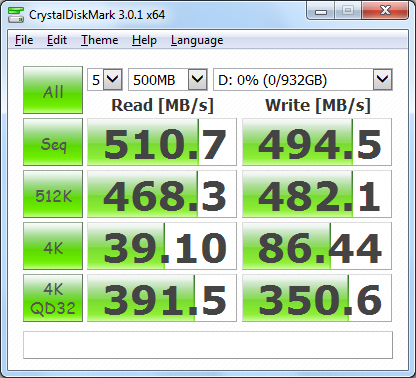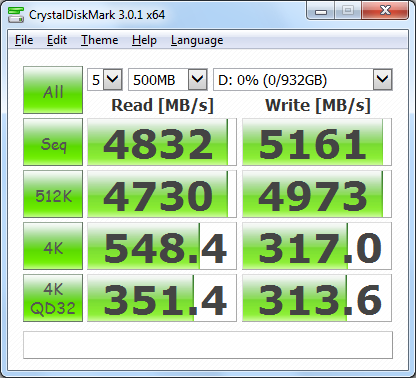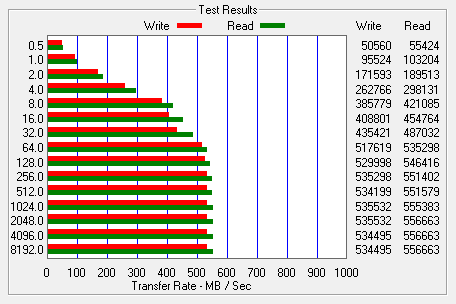The test system used in this review was an HP 8200 Elite. The computer came equipped with an Intel Core i5-2400 CPU, 4GB of DDR3 1333MHz memory, Seagate Barracuda 7200.12 ST3250312AS 250GB SATA 6 Gb/s hard drive, NVIDIA Quadro FX580 512MB PCIe graphics card and an Intel 82579-LM gigabit network card. For the operating system, I installed a fresh copy of Windows 7 Enterprise. I should also point out that our test system is not equipped with an mSATA port so we had to use an mSATA to SATA 6 Gb/s adapter card.
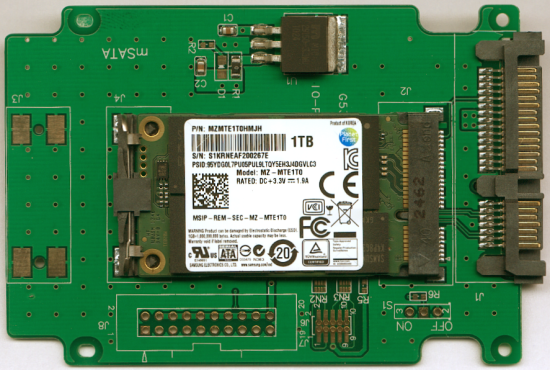
To test the performance of Samsung's 1TB 840 EVO mSATA, I ran a series of benchmarks using CrystalDiskMark 3.0.1, HD Tach RW 3.0.4.0, ATTO Disk Benchmark 2.46, AS SSD, HD Tune Pro 4.61, Anvil's Storage Utilities and Iometer. For comparison, I've also included test results from the Plextor PX-256M6M, OCZ Vector 150, OCZ Vertex 450, Silicon Power Slim S55, Samsung SSD 840 EVO, Seagate 600 SSD, SanDisk Extreme II, Plextor PX-256M5M, OCZ Vector, Plextor PX-256M5Pro Xtreme, Samsung SSD 840 Pro, Samsung SSD 840, Kingston Ultra Plus, OCZ Vertex 4, OCZ Agility 4 and Kingston HyperX 3K.

As I mentioned earlier, the 840 EVO mSATA is based on Samsung's latest MEX (S4LN045X01-8030) controller chip. Looking at the screenshot above, you can see that it performs equally well with both incompressible (0%) and compressible (100%) data.
CrystalDiskMark 3.0.1:
First, I ran a few quick tests using CrystalDiskMark. This benchmark tool measures the performance of a storage device by testing its sequential read and write speeds as well as its random read and write speeds using blocks 512K and 4K in size.
According to Samsung, the 1TB 840 EVO mSATA is capable of reading at 540 MB/s and writing at 520 MB/s when connected to a SATA 6 Gb/s port. While the drive performed as expected when writing, it came up a bit short in CrystalDiskMark's sequential read speed test. With RAPID mode enabled, these numbers increased by more than nine-fold. Looking at the screenshot above, you can see that the 840 EVO mSATA was able to read at 4,832 MB/s and write at a blazing 5,161 MB/s.
HD Tach RW 3.0.4.0:
Next, I used HD Tach to test the 840 EVO mSATA's read, write and burst speeds as well as its seek times and CPU usage.

Samsung SSD 840 EVO mSATA 1TB
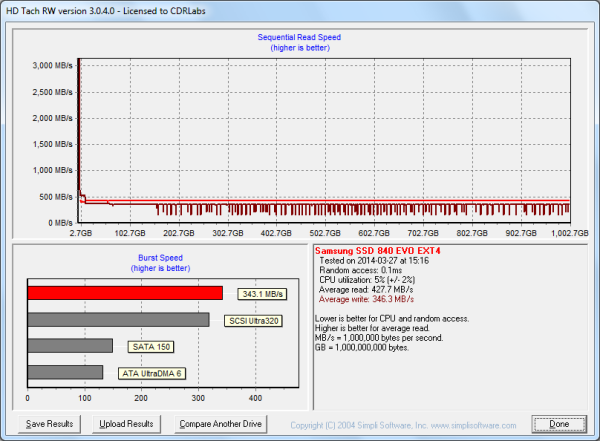
Samsung SSD 840 EVO mSATA 1TB (RAPID Mode)
Looking at the screenshot above, you can see that the 840 EVO had average read and write speeds of 428.7 MB/s and 341.8 MB/s respectively, as well as a burst speed of 372.8 MB/s. This time around, RAPID mode had very little effect on the drive's performance. Most likely, this is due to the way HD Tach bypasses the file system when performing its read and write tests.
ATTO Disk Benchmark 2.46:
I also used ATTO Disk Benchmark to test the 840 EVO mSATA's sequential read and write speeds. The tests are run using blocks ranging in size from 0.5KB to 8192KB and the total length set to 256MB.
When tested with ATTO, the 840 EVO mSATA's read speeds topped out at about 556 MB/s and its write speeds at 535 MB/s. With RAPID mode enabled, the read and write speeds were all over the place, but for the most part, it was a considerable improvement.


